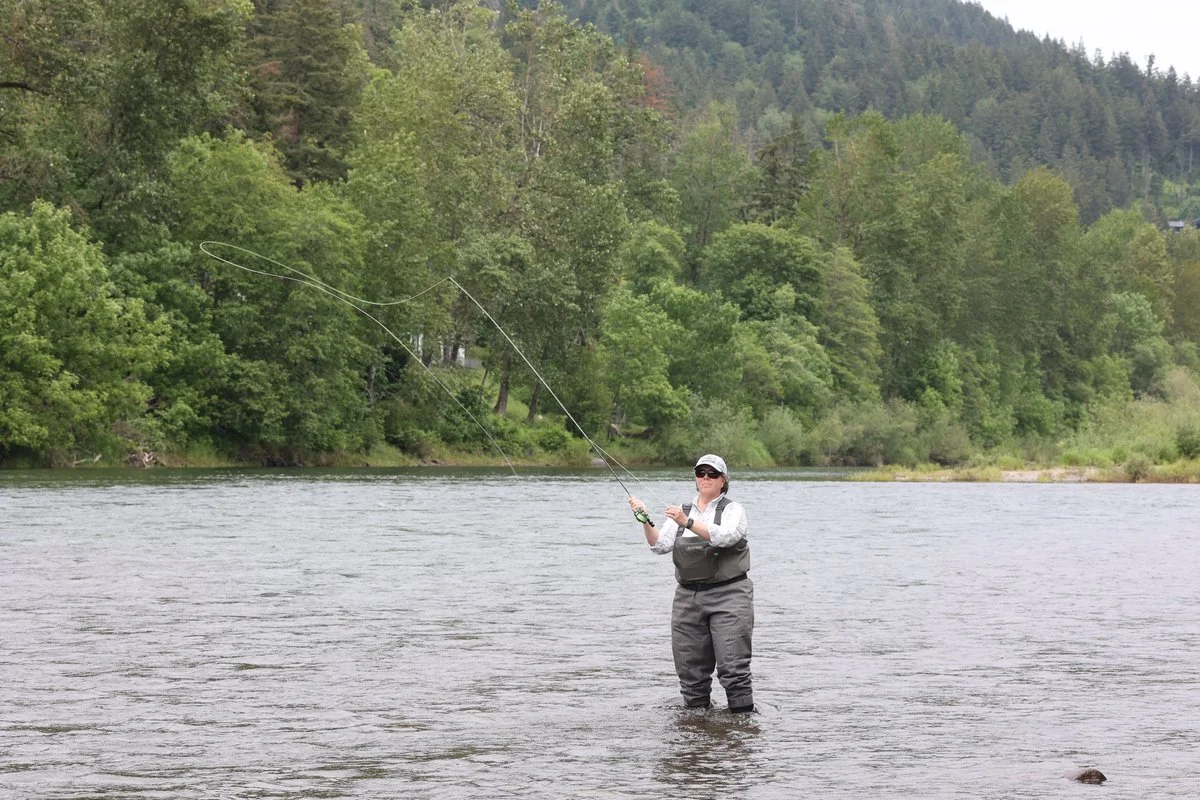
Flight of the Damsel Flies
As fishing’s demographic broadens nationally, a Eugene-based women’s fly fishing club navigates the pockets of misogyny that remain.
BY: Ethan Harmon
Photographer: Geoffrey Kerrigan
Carolyn Mason jolts her fishing line backwards into the air. It twists and twirls before a forward flick resettles it in the McKenzie River. Her routine catches the attention of an approaching walkaround fishing boat.
A voice beckons Mason’s name from the time-battered vessel. It doesn’t take long for Mason to clock her old friend. “I see you, Roger. I recognize that dent,” she says just before Roger’s boat passes under Armitage Bridge. It won’t be the first time that she is recognized today.
As one of Eugene’s most venerable fly fishers, Mason is no stranger to attention during her outings. “Especially since I’m one of the few female anglers,” she said.
According to a 2022 report by the Recreational Boating and Fishing Foundation, women make up 37% of the American fishing force. Fishing’s female demographic is 19.4 million strong, and growing, as this figure is up 8% from 2019. However, pockets of the historically male-dominated hobby still harbor some archaic gender attitudes.
“I have been called some interesting names,” Mason said at the New Day Bakery. She and other members of The Damsel Flies, a local women’s fly fishing club, occasionally stop by New Day to drink coffee and chat catches. Mason’s observation provokes knowing nods between fellow Damsel Flies Marie Meredith and Katherine Paiva.
Since early 2021, Mason has worked part-time at Home Waters Fly Fishing, a local retail shop. Though she was once president of the revered McKenzie Flyfishers club, male customers occasionally assume she’s merely a coworker’s spouse, or write her off entirely. “They just won't even acknowledge my presence, so I have to work extra hard to gain their trust,” she said. “If I can even do that.”
Fly fishing’s history is rife with such exclusion. The McKenzie Flyfishers club, formed in 1964, banned female members until the 1980s. “They had to be a men’s club where they could go off and have their retreats on the weekends without the wives,” Mason said. In fact, McKenzie hadn’t elected a woman as president until Mason herself in 2020.
Still, the pleasures of working at Home Waters far outweigh the slights tossed her way. “My whole purpose was to try to draw more women in and be a friendly face for them to feel included and not intimidated by all the guys,” she said.
Her pursuit has proven fruitful, as many Damsel Flies have dived deeper into fly fishing thanks to Mason. “When you walk in and you see her, it just feels so good to have someone you can talk to,” Paiva said.
But sexism within fly fishing pervades beyond mere microaggression. The Damsel Flies’ newsletter editor Betty Capt has faced confrontations during otherwise serene expeditions. “When we go fishing and we’re out in our little float tubes, there might be men on the bank that are casting with spinning rods and they try to hit us,” she said. “I think part of it is holding on to gender roles. They're holding on to their own club to be with their peers and do ‘men things.’”
This is not to say that fly fishers are predominantly hostile. “I have a lot of great male mentors and supporters, especially from McKenzie,” Mason said. “Not every guy that's giving me advice is necessarily giving it to me because he thinks I'm an idiot.”
Mason, Capt and Paiva believe that gender-based discrimination within fly fishing is gradually fading away amongst newer generations. But credit is also due to an influx of welcoming communities like The Damsel Flies. “They were so helpful in terms of mentoring and had no judgment about your skill level at all,” Capt said.
Ultimately, the communal aspect of The Damsel Flies adds a new dimension to fly fishing. Members can bond with others while allowing their quaint, meditative surroundings to quell internal stress. “Instead of complaining in my mind about things, I find solutions or let the water take them away,” Mason said. “It's nature's prescription.”
Surrounded by the rhythmic rush of the McKenzie, Mason recasts in pursuit of the rainbow trout, steelhead or infamous pikeminnow that populate the river. But if she ends the day without a single catch, she’ll still be satisfied. “I used to be interested in the numbers,” she said. “Now I just want to have some water and some open space.”
Carolyn Mason fishing on the McKenzie River, Eugene, OR.
Carolyn Mason fishing on the McKenzie River, Eugene, OR.

